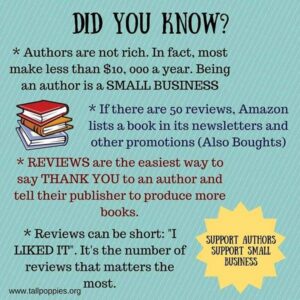 by Jay Hartman
by Jay Hartman
In a popular game called “Two Truths and a Lie.” the idea is to make three statements, and the person guessing must figure out which of those three statements is false.
A popular meme that says HELP SUPPORT AUTHORS has floated around lately, and I must say that it irks me every time it shows up. I’m sure the intention was well-meaning, but it’s based on a lot of inaccurate information.
What the meme says:
- Authors are not rolling in cash. Most make less than $10K a year.
- If a book has more than 50 reviews, Amazon will list it in newsletters and other promotions.
- Reviews can be short. “I liked it” is fine! It’s the number of reviews that matters the most.
- Reviews are the best way to tell an author THANK YOU and show that you enjoyed their book.
So, which of these are true and which are lies?
Authors are not rolling in cash. Most make less than $10k a year.
Yep, this one is true. The average self-published author, even with multiple titles, makes around $1,000 a year. That’s before they pay taxes on their income. Traditionally published authors will usually make more based on things like advances. There are always exceptions to the rule, and your mileage (and luck, and promotion, and….) may vary.
If a book has more than 50 reviews, Amazon will list it in newsletters and other promotions.
Sorry, but this one is untrue…even according to Amazon themselves in discussions I’ve had with management there. This has never been the case, and with the proliferation of fake and paid-for reviews, this is even more untrue than ever (if that’s possible).
 The Truth: Most promotions on Amazon are paid-for spots. Many of the titles that appear in newsletters are based on sales trends for the title or paid-for promotions by the publisher and have absolutely nothing to do with the number of reviews a title gets. Amazon has a team that chooses titles to appear in newsletters based on current hot topics and trending themes. Reviews have nothing to do with it.
The Truth: Most promotions on Amazon are paid-for spots. Many of the titles that appear in newsletters are based on sales trends for the title or paid-for promotions by the publisher and have absolutely nothing to do with the number of reviews a title gets. Amazon has a team that chooses titles to appear in newsletters based on current hot topics and trending themes. Reviews have nothing to do with it.
It should also be noted the meme doesn’t specify that those reviews would have to be positive. Amazon’s team rarely promotes any titles with a significant number of poor reviews. These days, they’re heavily focused on promoting their own titles.
Lastly, millions of people don’t buy books from Amazon. Why would you only worry about having 50 reviews there? You should have your titles reviewed by legitimate reviewers who cross-post to multiple retailer platforms or have a large enough following on their own website. How does 50 reviews on Amazon help you sell books to consumers who purchase from Barnes and Noble, Gardners, Overdrive, and others?
Reviews can be short. “I liked it” is fine! It’s the number of reviews that matter most.
I can’t even begin to tell you all the things wrong with this, but this statement is incredibly false.
The Truth: First of all, nobody considers “I liked it” a review or takes that seriously. The proliferation of fake reviews and paid-for reviews has made things like this ignorable. One look at a review like that and the reader automatically assumes it has no value. Librarians and people in charge of purchasing have told me repeatedly that they no longer consider Amazon reviews when making purchasing decisions, because of “I like it” and other poorly written reviews. They look at reliable, legitimate sources like Library Journal, Publisher’s Weekly, or review websites by reputable reviewers who actually discuss the book and its merits. Incidentally, Kirkus Reviews has lost a lot of its cachet with the same purchasers, due to charging for reviews and most Kirkus write-ups being a regurgitation of the book description with little added. Things have changed a lot with Kirkus over the years.
Reviews are the best way to tell an author THANK YOU and show that you enjoyed their book.
This is going to be controversial to a lot of you out there, but nope…this one isn’t true either.
The Truth: Leaving a review is the most passive thing you can possibly do to support an author, other than finishing the book and closing it. Unless somebody already knows about the title and shops the website where you left a review, they’re never going to find out about it. I’m not saying you shouldn’t leave a review, I’m saying it in no way is the best way to help an author. Sales and word-of-mouth on a broader scale make much more of an effect.
Therefore, if you really love a book, take actual action. Buy copies for your friends and family. Leave copies at coffee shops, airport lounges, and other public areas so people discover it. Use a website like BookCrossing to leave books out in the wild at unique places for people to find them. Sing its praises to your social-media following on all your platforms. Ask your local library to purchase copies and have the author in for a reading. Ask your local bookstores to pick up the book and invite the author for a signing. These are all active ways to help an author make more sales, rather than a random review on a website when other readers don’t even know the book exists.
Looking to get The Publisher Perspective? Send your questions to jhartman@untreedreads.com with TPP in your subject line. If your question is used, we’ll send you a free ebook from Untreed Reads.
Jay A. Hartman, editor-in-chief at Untreed Reads Publishing, founded Untreed Reads to promote ebooks with an emphasis on independent authors and publishers. He’s written about the ebook industry for fifteen years and previously served as content editor for KnowBetter.com, one of the internet’s oldest sites reporting on ebooks and epublishing.
